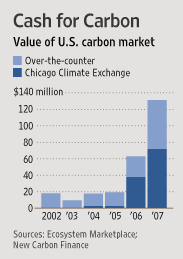Richard Sandor and his Chicago Climate Exchange (CCX) may be doing more to destroy the credibility of the carbon trading market than anyone in the world, as the Wall Street Journal makes painfully clear.
I urge anyone considering throwing their money away on rip-offsets to read the entire piece, “Pollution Credits Let Dumps Double Dip: Landfills Find New Revenue in Trading System Meant to Curb Greenhouse Emissions.”
 Sandor has turned the CCX into Bear Stearns or Lehman Brothers and turned the carbon trading market into another example of casino capitalism — all in the name of the almighty dollar.
Sandor has turned the CCX into Bear Stearns or Lehman Brothers and turned the carbon trading market into another example of casino capitalism — all in the name of the almighty dollar.
What CCX is doing — and how Sandor justified it to the WSJ — is almost beyond belief. Let’s start with the rip-offsets.
Buried in a recent Post article was the amazing fact that CCX was selling offsets from a landfill that was flaring methane — and that was going to keep doing so whether they got money from CCX or not. Even if you think rip-offset money should go for methane flaring projects (I don’t), paying people to do things that they were going to do anyway means that your money is not offsetting any emissions at all. In rip-offset jargon, the project fails the additionality test — for a good discussion of this important concept see this piece.
Should anyone pay CCX for making the sun rise in the morning? I suppose that if someone wants to flush their money down the toilet, that is their business. But if CCX is becoming the dominant player in the U.S. carbon market by selling rip-offsets and is working to become part of the foundation of a serious national carbon trading system, then it is everyone’s business.
After all, the story reports Sandor says the United States will adopt rules similar to CCX’s and that “companies that buy credits on the Chicago exchange today stand a good chance of being able to use them to comply with any future federal emissions rules.” Let’s hope that is just a huckster’s hype, since all major climate bills currently being considered rely heavily on rip-offsets — and John McCain would allow unlimited rip-offsets at the start of his climate plan.
The WSJ made clear today that the landfill story above was not an anecdote but a core CCX strategy:
For more than a decade, the landfill here [Cape May, NJ] has made extra profit simply by collecting methane given off by rotting trash, and selling it as fuel. Last year, the landfill learned that doing this also qualified it to earn hundreds of thousands of dollars via a new program that pays companies to cut their greenhouse-gas emissions …
“It seemed a little suspicious that we could get money for doing nothing,” says Charles Norkis, executive director of the Cape May County Municipal Utilities Authority …
Over the past two years, landfills from Pennsylvania to North Dakota have started selling extra credits on the Chicago exchange to profit from methane they were capturing anyway.
Selling credits is “gravy to us,” says Katherine Vesey, comptroller of the utility authority in Atlantic County, N.J., which was profitably capturing methane for two years before it started selling credits on the Chicago exchange.
The only thing more amazing than these utilities getting something for nothing is the justification that Sandor gives for doing this:
Mr. Sandor says the exchange’s main goal is to help develop a commodity that has financial value under any possible future U.S. law that to regulates greenhouse-gas emissions. The debate over whether or not a polluter would have cut its greenhouse-gas emissions without the financial incentive of credit sales is “quite interesting, but that’s not my business,” Mr. Sandor says. “I’m running a for-profit company.”
Un-friggin’-believable. How can you possibly develop a commodity that has financial value by selling a commodity that should have no financial value?
“That’s not my business. I’m running a for-profit company.“
That’s the best justification he could come up with — the same defense as the climate-destroying capitalists he seeks to replace? That could easily be humanity’s epitaph. The first thing that popped into my head when I read that line was the final paragraph in Orwell’s Animal Farm:
Twelve voices were shouting in anger, and they were all alike. No question, now, what had happened to the faces of the pigs. The creatures outside looked from pig to man, and from man to pig, and from pig to man again; but already it was impossible to say which was which.
Yes, I am aware that the “Outside credits from landfills represent only about 1 percent of the total emission cuts reported by the Chicago exchange.” But the Post earlier this year explained at length just how dubious are other offsets from the Chicago Climate Exchange are.
If CCX has such a callous disregard for the core principle of additionality, the core principle that you don’t pay people to do what they were already doing, then every single one of the offsets they sell to the public is called into question.
The bottom line again: The vast majority of offsets are, at some level, just rip-offsets. Spend your money elsewhere.
UPDATE: More background on Sandor and the “troubling flaws” in CCX from this long 2006 New York Times Magazine profile by the ever-prolific Jeff Goodell.
This post was created for ClimateProgress.org, a project of the Center for American Progress Action Fund.

